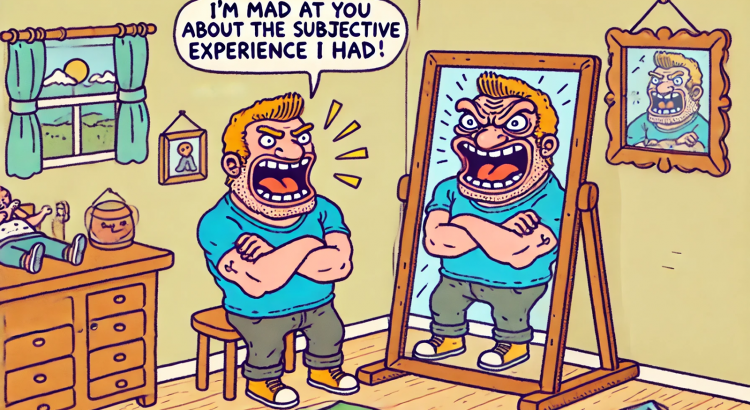If you interact with humans, here are two standard things they believe:
1 – “Everything I experience is real. I must trust my senses and memory because they are 100% accurate and objective.”
2 – “Others are responsible for my emotions. People ‘make me’ feel bad. They need to apologize for what they did ‘to me.’”
Neuroscience and two forms of therapy (Rational Emotive Behavior Therapy and Cognitive Behavior Therapy) say the opposite:
1 – Your brain hallucinates your conscious reality.
“Imagine being a brain. You’re locked inside a bony skull, trying to figure what’s out there in the world. There’s no lights inside the skull. There’s no sound either. All you’ve got to go on is streams of electrical impulses which are only indirectly related to things in the world, whatever they may be. So perception — figuring out what’s there — has to be a process of informed guesswork in which the brain combines these sensory signals with its prior expectations or beliefs about the way the world is to form its best guess of what caused those signals. The brain doesn’t hear sound or see light. What we perceive is its best guess of what’s out there in the world.”
“Instead of perception depending largely on signals coming into the brain from the outside world, it depends as much, if not more, on perceptual predictions flowing in the opposite direction. We don’t just passively perceive the world, we actively generate it. The world we experience comes as much, if not more, from the inside out as from the outside in.”
“If hallucination is a kind of uncontrolled perception, then perception right here and right now is also a kind of hallucination, but a controlled hallucination in which the brain’s predictions are being reined in by sensory information from the world. In fact, we’re all hallucinating all the time, including right now. It’s just that when we agree about our hallucinations, we call that reality.”
–Anil Seth, Neuroscientist, University of Sussex
2 – You are responsible for your own emotions. Under normal circumstances, you choose how to react and respond.*
“The term ‘emotional responsibility’ recognizes that beliefs, feelings, and behaviors can only be controlled by the person experiencing them. Again, other people are only responsible for the Activating event itself. Other people can act badly if they choose to, and they can create a stressful or negative situation. REBT does not absolve them of responsibility for their actions. However, each person is responsible for the level of emotional distress that results from another person’s bad behavior. From this perspective, the phrase, ‘they made me feel ___’ is not exactly correct, as the other person actually created a negative situation where you made yourself feel an undue level of distress. Their bad behavior made stress and a functional negative emotion (e.g., sadness) highly probable, but your dysfunctional beliefs are necessary to create emotional disturbance (e.g., depression).”
–Albert Ellis Institute
Two people who disagree on these fundamentals are in for perpetual conflict. Before getting too involved with someone, find out which playbook they use.
It’s likely the first (a.k.a. “everything I experience is real, and others are responsible for my emotions”). Expect to spend a lot of time apologizing.
Ideally, we can be sensitive to each other’s feelings while accepting that we experience our own versions of events.
I recommend the book Non-Violent Communication.
*As always, the disclaimer: I know. Ultimately, we don’t have free will.
